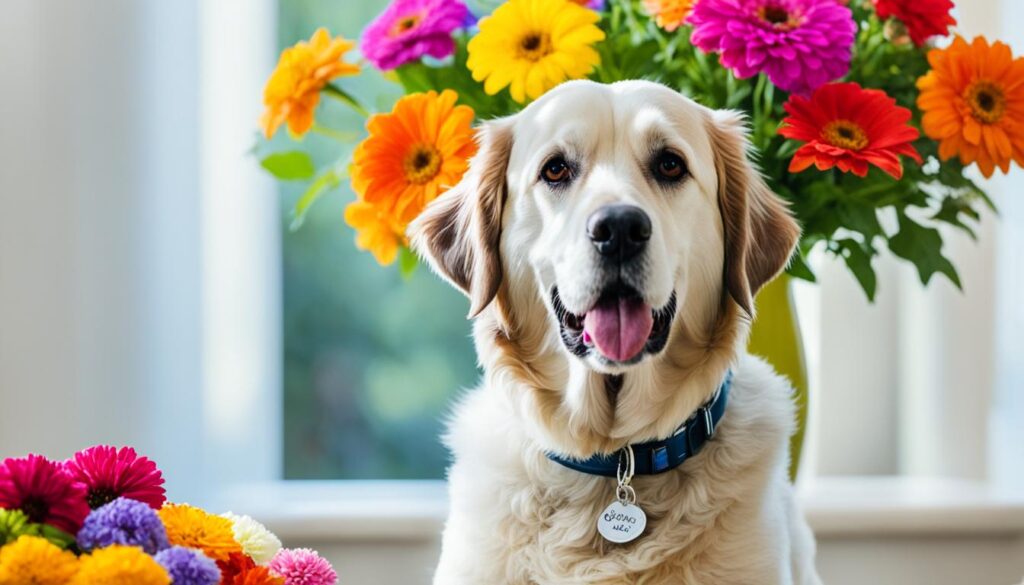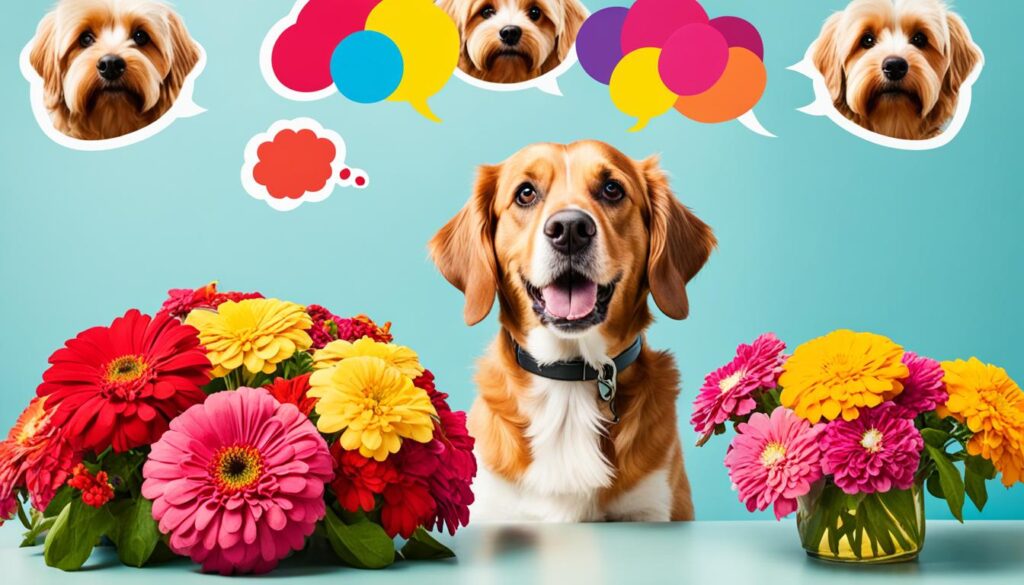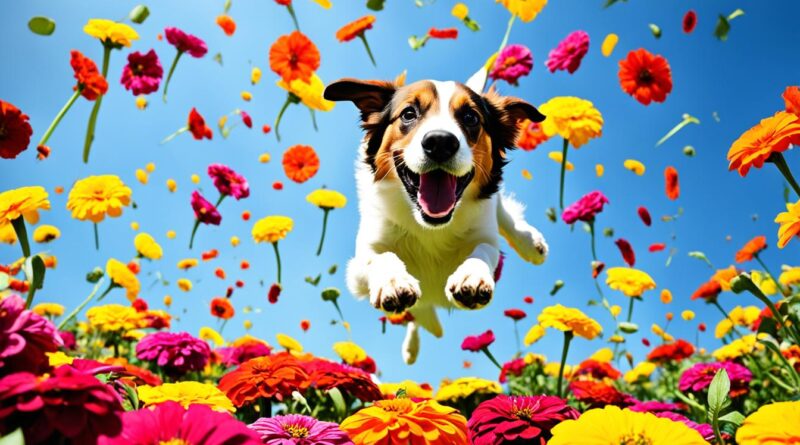Zinnias and Dogs: Are They a Safe Mix?
When it comes to creating a pet-friendly garden, it’s essential to consider the safety of our furry friends. If you’re a dog owner and have a passion for gardening, you may be wondering if zinnias are safe for your four-legged companion. In this article, we will explore the relationship between zinnias and dogs, addressing concerns about toxicity and potential risks.
Many people believe that certain plants, including zinnias, are toxic to dogs. However, it’s important to know that zinnias are generally considered non-toxic to our canine friends.
While individual reactions may vary, excessive consumption of zinnias could result in mild gastrointestinal symptoms such as drooling, vomiting, or diarrhea. Therefore, it’s advisable to prevent dogs from munching on any plants in the garden, even if they are considered safe.
Key Takeaways
- Zinnias are generally considered non-toxic to dogs.
- Excessive consumption of zinnias may cause mild gastrointestinal symptoms.
- It is best to prevent dogs from eating plants in the garden, even if they are considered safe.
Non-Toxic Flowers for Dogs
According to the American Society for the Prevention of Cruelty to Animals (ASPCA), there are many non-toxic flowers that are safe for dogs. These include zinnias, African violets, orchids, sunflowers, petunias, celosia, asters, and marigolds.
“It’s important to create a dog-friendly environment in your garden. By choosing non-toxic flowers, you can ensure your furry friend can enjoy the beauty of your garden without any risks.”
These flowers can be enjoyed in the garden without worrying about their potential toxic effects on dogs. It is important to note that while these flowers are generally safe, every dog may react differently, and it is best to prevent them from nibbling on any plants.
Non-Toxic Flowers for Dogs:
| Flower | Description |
|---|---|
| Zinnias | Beautiful, colorful flowers that are safe for dogs to be around. |
| African Violets | Pretty and delicate flowers that pose no harm to dogs. |
| Orchids | Elegant flowers that can be safely enjoyed by dogs. |
| Sunflowers | Bright and happy flowers that are non-toxic to dogs. |
| Petunias | Colorful, low-maintenance flowers that are safe for dogs. |
| Celosia | Unique and vibrant flowers that won’t harm dogs if ingested. |
| Asters | Charming and daisy-like flowers that are safe for dogs. |
| Marigolds | Pungent and pest-repellent flowers that are also dog-friendly. |
Remember, while these flowers are considered non-toxic, it’s important to monitor your dog’s interactions with them and prevent them from consuming any plants in the garden. By creating a dog-friendly garden with safe flowers like zinnias, you can enjoy a beautiful and worry-free space for both you and your furry companion.
Zinnias and Pet Safety
Zinnias are considered safe for dogs and do not pose significant risks to their health. However, it is still important to practice responsible gardening and ensure a pet-friendly environment in the garden.
To maintain pet safety, it is recommended to provide dogs with a designated play area away from plants to minimize their interest in munching on them. Additionally, using protective measures such as fencing or plant covers can help prevent dogs from accessing potentially toxic plants.
If a dog ingests zinnias or any other potentially harmful plant, prompt action should be taken. It is crucial to contact a veterinarian for guidance and advice. Veterinary professionals have the knowledge and expertise to assess the situation and provide appropriate treatment if necessary.
Remember, prevention is key when it comes to keeping pets safe. While zinnias themselves are generally harmless to dogs, it is always better to err on the side of caution and create a garden environment that prioritizes your furry friends’ well-being.
Pet-Friendly Gardening Tips:
- Choose dog-friendly plants such as zinnias and other non-toxic flowers.
- Keep dogs away from potentially toxic plants by creating physical barriers.
- Consider using natural deterrents like vinegar or citrus sprays to discourage dogs from exploring certain areas.
- Place planters and pots out of reach or use hanging baskets to prevent dogs from accessing them.
- Regularly inspect your garden for any potentially harmful plants and promptly remove them.
Quote:
“By being proactive and creating a pet-safe garden environment, you can enjoy the beauty of zinnias without worrying about the dangers they may pose to your furry friends.”
Zinnias and Dog Health:
| Dangers of Zinnias for Dogs | Symptoms of Zinnia Ingestion in Dogs |
|---|---|
| Mild gastrointestinal distress | Drooling |
| Vomiting | |
| Diarrhea |
Other Non-Toxic Flowers for Dogs
In addition to zinnias, there are several other non-toxic flowers that are safe for dogs. These include African violets, orchids, sunflowers, petunias, celosia, asters, marigolds, snapdragons, grape hyacinths, haworthia, rose of Sharon, ice plant, nasturtiums, Peruvian lilies, coreopsis, and Venus flytrap. These flowers can be enjoyed in the garden without worrying about their potential toxic effects on dogs.

It’s important to create a safe and dog-friendly environment in your garden, and choosing non-toxic flowers is a step in the right direction. By incorporating these dog-safe flowers into your garden, you can add beauty and color while ensuring the well-being of your furry friends. Whether you have a playful pup or a curious canine companion, these non-toxic flowers offer a safe and enjoyable outdoor space for your dog to explore.
Below is a table showcasing the various non-toxic flowers for dogs:
| Non-Toxic Flowers for Dogs |
|---|
| African violets |
| Orchids |
| Sunflowers |
| Petunias |
| Celosia |
| Asters |
| Marigolds |
| Snapdragons |
| Grape hyacinths |
| Haworthia |
| Rose of Sharon |
| Ice plant |
| Nasturtiums |
| Peruvian lilies |
| Coreopsis |
| Venus flytrap |
Toxic Flowers to Keep Away from Dogs
While zinnias are generally safe for dogs, it’s essential to be aware of certain flowers that can be toxic to our furry friends. Ingestion of these flowers can lead to severe toxicity and have harmful effects on a dog’s health. It is crucial to avoid having these flowers in your garden or as part of a floral arrangement if you have a dog at home.
The following flowers are considered toxic to dogs:
| Flower | Common Name |
|---|---|
| Azaleas | Rhododendron spp. |
| Birds of Paradise | Strelitzia reginae |
| Tulips | Tulipa spp. |
| Daffodils | Narcissus spp. |
| Iris | Iris spp. |
| Poinsettias | Euphorbia pulcherrima |
| Oleander | Nerium oleander |
| Narcissus | Narcissus spp. |
| Wisteria | Wisteria spp. |
| Lilies | Lilium spp. |
In addition to the flowers listed above, there are many others that can be toxic to dogs. It’s important to research any floral additions to your home or garden to ensure they are safe for your four-legged companions.
Remember, prevention is key when it comes to protecting our canine friends from the dangers of toxic flowers. If you suspect that your dog has ingested any of these flowers or is exhibiting symptoms of toxicity, immediately contact your veterinarian for guidance and assistance.

“Prevention is key when it comes to protecting our canine friends from the dangers of toxic flowers.”
Common Symptoms of Plant Poisoning in Dogs
Dogs who have ingested toxic plants or flowers may exhibit a variety of symptoms. These symptoms can vary depending on the type of plant, the severity of the exposure, and the individual dog’s reaction. It is important for dog owners to be aware of these symptoms so they can take appropriate action if their pet shows signs of plant poisoning.
Common Symptoms:
- Lethargy
- Loss of appetite
- Vomiting
- Drooling
- Dehydration
- Uncontrollable urination or thirst
- Depression
- Bleeding gums
- Agitation
- Black or bloody stools
- Nosebleeds
If a dog exhibits any of these symptoms for more than 24 hours, it is recommended to seek veterinary care immediately. Timely intervention can be crucial in preventing further complications and ensuring the well-being of your furry companion.
Conclusion
In conclusion, zinnias are generally considered non-toxic to dogs and are safe for them to be around. This makes them a great option for dog owners who want to have a colorful and vibrant garden without worrying about their furry friends’ well-being. However, while zinnias may be safe, it is crucial to practice responsible gardening and ensure a pet-friendly environment in the garden.
There are many non-toxic flowers that can be enjoyed in the garden without worrying about their potential toxic effects on dogs. African violets, orchids, sunflowers, petunias, celosia, asters, marigolds, and several other flowers are also safe options for dog-friendly gardens. Nonetheless, it is important to be aware of any potentially toxic plants and prevent dogs from ingesting them as ingestion can still lead to mild gastrointestinal symptoms.
If a dog does happen to ingest a potentially harmful plant, prompt action should be taken. It is recommended to consult a veterinarian for guidance and to ensure the safety and well-being of the dog. By being informed about safe plants and proactive in creating a pet-friendly environment, dog owners can create a beautiful and enjoyable garden for both their pets and themselves.
FAQ
Are zinnias poisonous to dogs?
Zinnias are generally considered non-toxic to dogs and do not contain compounds that pose significant risks to their health. However, excessive consumption of zinnias could result in mild gastrointestinal symptoms such as drooling, vomiting, or diarrhea. It is best to prevent dogs from munching on any plants in the garden, even if they are considered safe.
What are some non-toxic flowers for dogs?
According to the American Society for the Prevention of Cruelty to Animals (ASPCA), zinnias are safe for dogs, along with other non-toxic flowers such as African violets, orchids, sunflowers, petunias, celosia, asters, and marigolds. These flowers can be enjoyed in the garden without worrying about their potential toxic effects on dogs. However, individual reactions may vary, and it is best to prevent dogs from nibbling on any plants.
How can I ensure pet safety in my garden with zinnias?
While zinnias are considered safe for dogs, it is important to practice responsible gardening and provide a pet-friendly environment. This can be done by designating a play area for dogs to minimize their interest in plants and using protective measures like fencing or plant covers to prevent access to potentially toxic plants. If a dog ingests zinnias or any other potentially harmful plant, prompt action should be taken, and a veterinarian should be consulted for guidance.
What are some other non-toxic flowers for dogs?
Besides zinnias, there are several other non-toxic flowers that are safe for dogs. These include snapdragons, grape hyacinths, haworthia, rose of Sharon, ice plant, nasturtiums, Peruvian lilies, coreopsis, and Venus flytrap. These flowers can be enjoyed in the garden without worrying about their potential toxic effects on dogs. As always, it is important to prevent dogs from ingesting any plants, even if they are considered safe.
What flowers should I keep away from dogs due to toxicity?
While zinnias are generally safe for dogs, there are certain flowers that should be avoided as they can be toxic to dogs. Some of these include azaleas, Birds of Paradise, tulips, daffodils, iris, poinsettias, oleander, narcissus, wisteria, and lilies. Ingestion of these flowers can lead to severe toxicity and harmful effects on a dog’s health. It is important to be aware of these flowers and not have them in the garden or as part of a floral arrangement if you have a dog at home.
What are the common symptoms of plant poisoning in dogs?
Dogs who have ingested toxic plants or flowers may exhibit a variety of symptoms. These can include lethargy, loss of appetite, vomiting, drooling, dehydration, uncontrollable urination or thirst, depression, bleeding gums, agitation, black or bloody stools, nosebleeds, and more. If a dog exhibits any of these symptoms for more than 24 hours, it is recommended to seek veterinary care.


